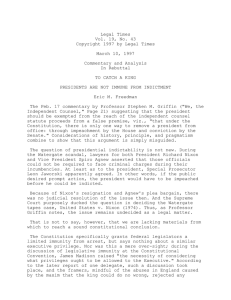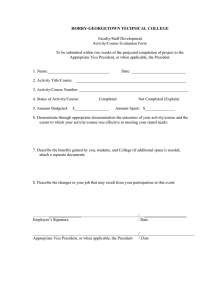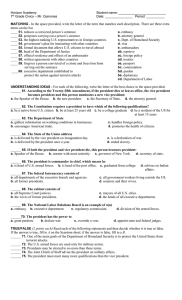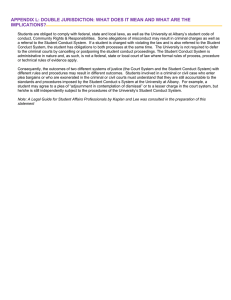The National Law Journal Volume 13, Number 49
advertisement
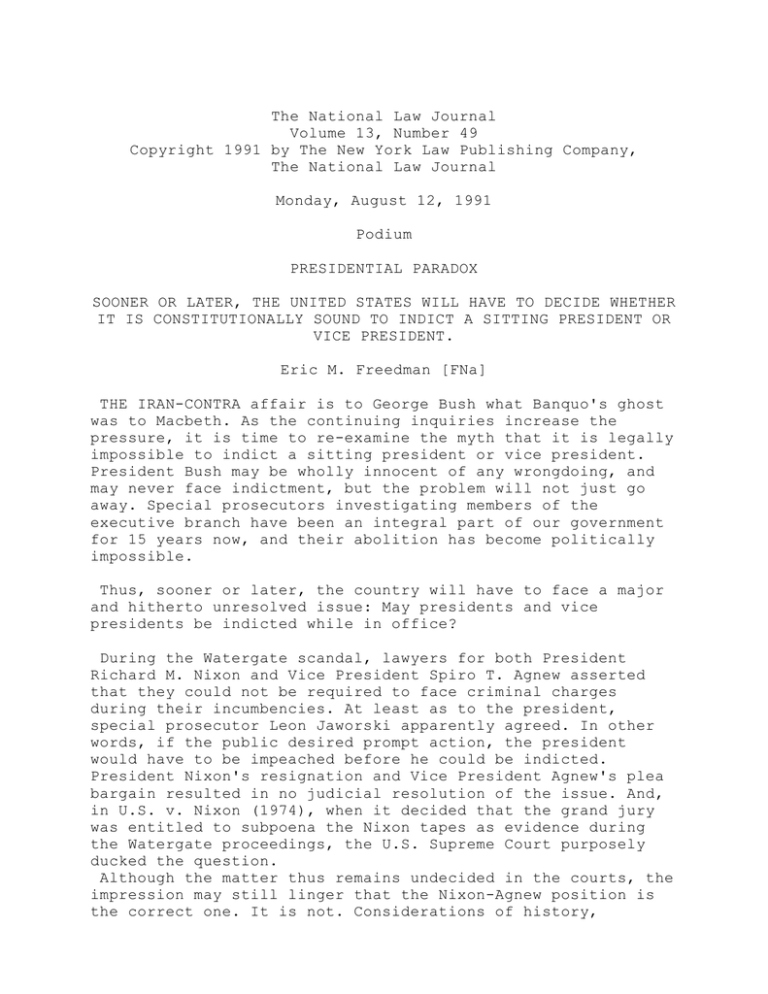
The National Law Journal Volume 13, Number 49 Copyright 1991 by The New York Law Publishing Company, The National Law Journal Monday, August 12, 1991 Podium PRESIDENTIAL PARADOX SOONER OR LATER, THE UNITED STATES WILL HAVE TO DECIDE WHETHER IT IS CONSTITUTIONALLY SOUND TO INDICT A SITTING PRESIDENT OR VICE PRESIDENT. Eric M. Freedman [FNa] THE IRAN-CONTRA affair is to George Bush what Banquo's ghost was to Macbeth. As the continuing inquiries increase the pressure, it is time to re-examine the myth that it is legally impossible to indict a sitting president or vice president. President Bush may be wholly innocent of any wrongdoing, and may never face indictment, but the problem will not just go away. Special prosecutors investigating members of the executive branch have been an integral part of our government for 15 years now, and their abolition has become politically impossible. Thus, sooner or later, the country will have to face a major and hitherto unresolved issue: May presidents and vice presidents be indicted while in office? During the Watergate scandal, lawyers for both President Richard M. Nixon and Vice President Spiro T. Agnew asserted that they could not be required to face criminal charges during their incumbencies. At least as to the president, special prosecutor Leon Jaworski apparently agreed. In other words, if the public desired prompt action, the president would have to be impeached before he could be indicted. President Nixon's resignation and Vice President Agnew's plea bargain resulted in no judicial resolution of the issue. And, in U.S. v. Nixon (1974), when it decided that the grand jury was entitled to subpoena the Nixon tapes as evidence during the Watergate proceedings, the U.S. Supreme Court purposely ducked the question. Although the matter thus remains undecided in the courts, the impression may still linger that the Nixon-Agnew position is the correct one. It is not. Considerations of history, principle and pragmatism combine to show that the argument should be rejected the next time it is raised, whether by President Bush or by any future president or vice president. Although some have argued that the president, like the king, embodies the country, the analogy is flawed. In this country, the law is king. Our fundamental principle is that public officers hold their powers in trust as stewards for "We the People" and must remain always accountable to us for their performance. As is so often the case, we do not have definitive evidence of the framers' intent regarding this issue. But while original intent may be obscure, historical practice is not. In 1804, Aaron Burr, then the vice president, was indicted by the state of New Jersey for killing Alexander Hamilton in a duel. In response to the indictment, a group of senators sent the governor a letter urging that the prosecution be discontinued. But it is noteworthy that, while they argued that this course would "facilitate the public business by relieving the President of the Senate from the peculiar embarrassments of his present situation, and the Senate from the distressing imputation thrown upon it, by holding up its President to the world as a common murderer," they did not even suggest that the Constitution granted Burr immunity from the prosecution. In the intervening years, high federal officials have repeatedly been the subjects of criminal charges while still in office. Congressmen and senators have been indicted, and the courts have uniformly adhered to the position taken by the Supreme Court in 1906: despite the importance of the legislator's function, there is no constitutional barrier to prosecution. Similarly, there have been six indictments of sitting federal judges in the past 15 years. In each case, the courts recognized the vital importance of an independent judiciary but adopted the view, first taken by the attorney general of the United States in 1796, that the prosecution was permissible. And when, in 1984, Secretary of Labor Raymond Donovan became the first sitting Cabinet member ever indicted, the idea of claiming an exemption from prosecution apparently did not even cross his mind. THIS IS NOT surprising. To be sure, the courts have sometimes invented doctrines of official immunity -- but only in civil cases, not criminal ones. And, even then, the courts have consistently attempted to tailor the rulings in such a way as to encourage officeholders to perform their duties diligently and fearlessly, without shielding them from the consequences of deliberate wrongdoing. This uniform course of practice is consistent with what we know of the philosophy underlying the structure of our government. The framers had no faith in the goodness of human nature, particularly the human nature of officeholders. On the contrary, they believed that power tends to corrupt. The men who wrote the Constitution would be saddened but by no means shocked to hear us discussing matter-of-factly the possibility that the country's highest officials might be guilty of criminal behavior. For the framers, the primacy of law was the basic instrument by which the inevitable tendency of public officials to abuse their positions would be curbed. So, to control predictable misconduct they should be understood to have provided for two separate and simultaneous checks -- impeachment and indictment -- on our most powerful public officials. IMPEACHMENT was designed to curb behavior undermining the president or vice president's fitness to continue governing. As Hamilton wrote in the Federalist Papers, the impeachment power was vested in Congress because the purpose of the procedure is to reach those offenses "of a nature which may with peculiar propriety be denominated political." Thus, although the Constitution speaks in terms of "high crimes and misdemeanors," it has long been settled that impeachable abuses of power are not limited to crimes. As then-Rep. Gerald R. Ford said while seeking the impeachment of Justice William O. Douglas in 1970, "About the only thing that the authorities can agree upon in recent history...is that an offense need not be indictable to be impeachable." When President Nixon authorized the bombing of Cambodia while concealing it from Congress, this was an impeachable offense, even if not a crime, and could properly have led to his removal from office. Criminal sanctions serve a different social purpose. The criminal code, defined in statutes and applied by a neutral judiciary, embodies a minimum standard of behavior that society requires of all citizens. If, as was rumored, President Lyndon B. Johnson drove drunk on his ranch, the appropriate punishment would have been a conviction for drunken driving -- not impeachment. In this way, society would have expressed its disapprobation of his conduct, while retaining a leader who had done nothing to undermine his political legitimacy. Many misdeeds committed by presidents and vice presidents will not fall unambiguously into one or the other category. But since this proves no more than that the same acts may sometimes appropriately lead to both impeachment and indictment, even those who argue that a sitting president should not be subject to criminal liability ordinarily do not quarrel with the distinction itself. Rather, they raise two much more practical arguments, which we may label the "harassment objection" and the "functional removal objection." The first of these is that if presidents and vice presidents were amenable to criminal prosecutions, they might be subjected to endless harassment by politically motivated local prosecutors. Nearly two centuries of experience demonstrate that this concern is overblown. In 1807, when Aaron Burr (by this time a private citizen) was charged in federal court with treason, Chief Justice John Marshall wrote a landmark opinion affirming the defendant's right to seek possibly exculpatory documents and testimony from President Thomas Jefferson. Ever since then, the law has required that presidents and vice presidents give evidence in criminal proceedings. Indeed, Chief Justice Warren Burger ringingly reaffirmed this principle for a unanimous Supreme Court in Nixon citing "our historic commitment to the rule of law." Nonetheless, the courts have always shown extreme deference to both presidents and vice presidents, and their testimony has rarely been taken. For example, independent counsel Lawrence Walsh (following the example set by special prosecutors Archibald Cox and Jaworski) has been highly respectful of both Presidents Reagan and Bush, and has obtained evidence from them without actually calling them to testify before the grand jury. THE HISTORICAL record, then, provides no basis for the concern that acknowledging the liability of the president and vice president to criminal prosecution will result in their being harassed. On the contrary, there is every reason to believe that the courts will continue to accommodate them generously. Moreover, it is quite likely that, even while asserting criminal jurisdiction, the courts will decline to look into the substance of matters arguably within the confines of the officeholders' official duties. For instance, an indictment charging a president or vice president with a conspiracy to assassinate a foreign leader would almost surely be dismissed -- not because of any doctrine of immunity from prosecution, but because the charges themselves would be beyond the purview of an ordinary criminal trial. It is, therefore, safe to assume that application of the criminal law will be restricted to just the area in which it is needed, controlling venality. In light of the ample legal resources available to the leaders of the executive branch and their power to mobilize opinion, subjecting them to the infrequent need to defend themselves in the courts is greatly preferable to turning each allegation of criminal conduct into the traumatic struggle of an impeachment battle. Impeachment proceedings are far more disruptive than conventional litigation to the officeholder personally and to the country as a whole. It should not be necessary to impeach simply because there is no other way to get the president or vice president to respond to ordinary criminal charges. Yet a rule of absolute immunity would have just this effect. The "functional removal" argument is equally unavailing. Mr. Jaworski, for example, apparently believed that because the president or vice president could not run the country from a prison cell, incarceration would be tantamount to removal from office, which is the exclusive prerogative of Congress. But this precise argument has consistently been rejected with regard to federal legislators and judges. Common sense suggests that an indicted president or vice president will in all likelihood resign or be impeached. If he or she retains the political support to resist these steps, it is highly improbable that the indictment will lead to a prison term while in office. But even if that unlikely event came to pass (and modern technology did not indeed permit one to run the country from a prison cell), the 25th Amendment, ratified in 1967, provides a procedure for relinquishing executive power in case of a temporary disability and then regaining it -- a mechanism as appropriate for use before imprisonment as before surgery. In sum, it would serve rather than violate the Constitution to have the indictment of a president heard in a court of law, just as in the case of any other citizen. Any court confronted with the issue should rule accordingly. A contrary conclusion would not only feed the imperial delusions to which too many high officials in this century have succumbed, but would make a mockery of our proud claim to have instituted a government of laws rather than of men. FNa Mr. Freedman is a professor of constitutional law at Hofstra University School of Law. *END*END*END*END*END*END*END*END*END*END*END*END*END*END*END*E ND*END*END*END* 1858599 - HUYCK,MELISSA Date and Time Printing Started: pm (Central) 04/04/2000 02:12:57 Date and Time Printing Ended: pm (Central) 04/04/2000 02:12:57 Offline Transmission Time: Number of Requests in Group: Number of Lines Charged: 00:00:00 1 203 *END*END*END*END*END*END*END*END*END*END*END*END*END*END*END*E ND*END*END*END*
